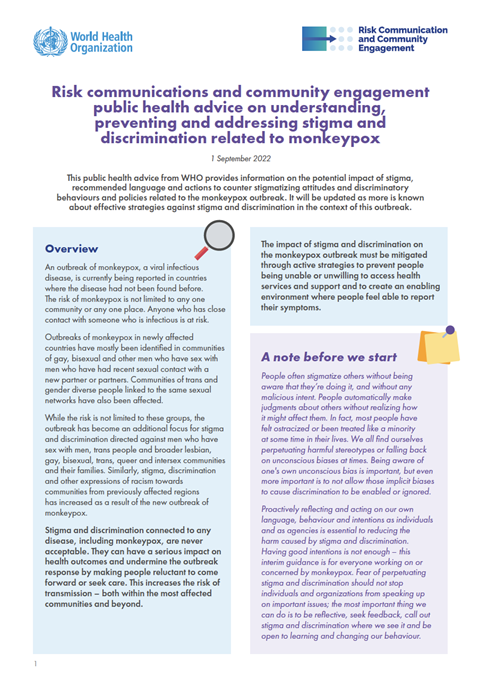As the mpox (monkeypox) outbreak continues to unfold, the importance of effective strategies to guard against and respond to stigma and discrimination is increasingly clear. It is against this backdrop that the WHO recently released its Public health advice on understanding, preventing and addressing stigma and discrimination related to mpox, which provides information on the potential impact of stigma and recommends language and actions to counter stigmatizing attitudes and discriminatory behaviours and policies. “In the very early days of the outbreak, we anticipated that affected populations would face stigma. Our response focused heavily on targeted, behaviour-based yet sensitive communication and engagement. This guide took our work to the next level by helping individuals recognize their own unintentional biases that could lead to stigmatization of those most in need.” Melinda Frost, Risk Communications and Community Engagement Lead, WHO Health Emergencies Programme |  |
Stigma and discrimination or associated fears may prolong a disease outbreak by stopping people from coming forward for information or seeking testing or care, which undermines public health efforts. For mpox, stigma, discrimination and racism have been particularly directed against communities initially most affected by the disease, namely men who have sex with men, trans people and gender diverse communities, and communities from previously affected regions. Lessons learned from decades of response to HIV were used to develop the mpox public health advice and deconstruct these stigmatizing attitudes.
“We have learned over the 40 years of the HIV response that stigma and discrimination are critical barriers to equitable access to prevention, treatment and care. We have an opportunity with mpox to not repeat the mistakes of the past and ensure all people with mpox and HIV have access to testing, vaccines and treatment, free from stigma and discrimination.” Meg Doherty, Director Global HIV, Hepatitis and STI Programmes, WHO
“At WHO, we have adopted and encouraged the use of clear, simple, descriptive and non-judgemental language when talking about mpox and how it spreads. In this way, people feel empowered to understand and manage their own risks and join in public health efforts to help prevent further spread, for example through adapting their activities or helping to reach their contacts who may be at risk.” Rosamund Lewis, WHO Technical Lead for the mpox global outbreak response.
Harmful behaviours are never acceptable and while stigma is often fueled by fear or anxiety, stigmatizing language can also be used by people accidentally and/or without ill intent. Part of addressing such attitudes involves undertaking an inventory of our own unconscious biases, by reflecting on our own beliefs and perceptions, seeking feedback and calling out stigma and discrimination when we see it. Fundamentally, this requires being open to receiving feedback, learning and changing our own behaviour, as individuals and as organizations. In this respect, WHO’s public health advice provides a wealth of practical information primary targeted towards governments, UN agencies, civil society, health workers and the media, to support a proactive approach to reducing stigma and discrimination and ensuring people seeking health care are treated with kindness, confidentiality and respect.
